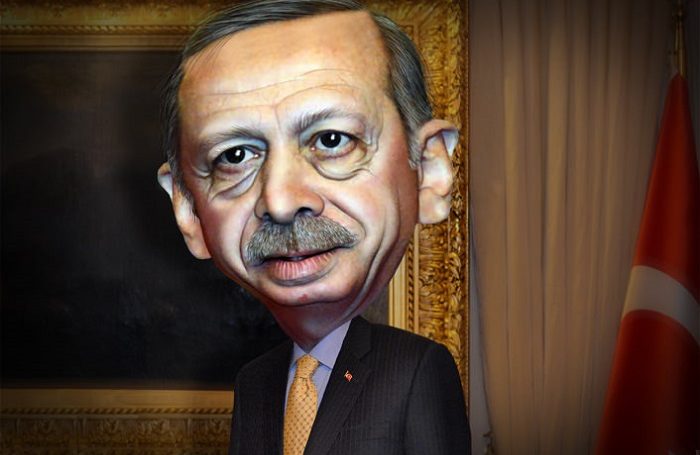
The past two weeks saw the ZDF satirist Jan Böhmermann become the latest victim in Turkish president Recep Tayyip Erdogan’s transnational campaign to silence any voices he dislikes, particularly when those voices come from those who do not like him. Sadly, we have all become familiar, even blasé about Ankara’s readiness to curtail free speech and imprison journalists, academics, and comedians alike. Now it seems that Berlin is providing an unwelcome fillip to this behaviour. Following Böhmermann’s reading of an obscene poem targeted at Erdogan, German Chancellor Angela Merkel waded into the fray condemning the German comedian’s actions as indefensible, thus passively suggesting that he may face prosecution. It is illegal under German law to insult foreign leaders. Yes, you read that correctly: Germany has a law that prohibits its citizens from impugning Vladimir Putin and, until about eight years ago, one George W. Bush. On April 15, a German judge cleared the way for Böhmermann to be charged with violation of Paragraph 103 which carries up to a three-year jail sentence (incidentally, the German government plans to repeal the now-controversial law in 2018).
While I agree that the poem – which includes sophomoric attacks on the smell of Erdogan’s faeces, his love of bestiality, and his small penis size – lacks any redeeming genuine political or even humorous value, it remains satire given how and where it was delivered, that is on Böhmermann’s television program Neo Magazin Royale, which any viewer would recognise as modelled on the classic structure with an introduction with a bit of stand-up comedy, a few songs, and silly bits or skits, sometimes followed by an interview with a live guest (Note: Böhmermann and his staff have gone on hiatus until at least May 2016). The venue, while not the only consideration, demands we recognise Böhmermann’s tasteless attack on Erdogan as a form of free speech, something that Merkel supposedly is ready to defend to the nth degree. Yet, as many analysts have pointed out, Berlin needs its increasingly paranoid and authoritarian Turkish partners to ensure that the current deal to stanch the flow of refugees and economic immigrants from continuing to flow into the Balkans and from there to Germany and other points in Northern Europe.
In such a highly charged political environment, we are seeing that European values associated with free speech might just be more malleable than once thought. At the turn of the millennium, Kazakhstan’s diplomatic corps in London asked Tony Blair’s government to ‘ban’ Borat (i.e., Sacha Baron Cohen) for his unflattering portrayal of the Central Asian republic. The British response was (thankfully) predictable: a polite speech about the entrenched nature of political humour as a natural right in liberal democracies. However as we have seen from the reaction to Charlie Hebdo’s purposefully inciting form of satire, many in Europe are increasingly wary of ‘offending’ sensitive readers outside the confines of the European Union. Perhaps this is understandable given that many of the French magazine’s barbs have been directed at religious groups, i.e. collections of private individuals, while attacks on public figures like the Pope have been accepted as part and parcel of the French tradition of social critique.
The Böhmermann case, if in fact charges are brought, represents something altogether different, given that heads of state, particularly imbecilic or nasty ones, should be fair game for comedy. What use is satire if you cannot go after the ones at the top of the political pyramid? Even in the Middle Ages, Europe made room for lampooning the liege, whether through the court jester or the charivari inversions of the carnival. We must thank Erdogan for bringing to light this ridiculous German law which represents a dangerous example of political correctness in its worst form. As one commentator noted, ‘This is not Watergate, but it has probably a lot more impact on real politics than the average journalist makes in his lifetime.’
Though not necessarily intended to draw out the importance of the popular culture-world politics continuum, the emerging Berlin-Ankara axis of enforced ‘taste’ in satire shows just how important cultural producers are becoming in bringing important issues to light in a world where print is dead, news is entertainment, and Facebook is the primary vehicle for learning about what country blew up today. Having just returned from a European International Studies Association workshop on the relationship between popular culture and world politics in Tubingen, Germany and passing through the Frankfurt train station where there was large sign in Arabic and English directing refugees to information centres, these issues are certainly on my mind. While I tend to eschew activism in my own writing, I cannot help but use this platform to issue a call for those of us working the field of education and policy to demand from our leaders – all of them – that we should be able to make fun of them. Letting the Erdogans of the world gain sway over the Merkels will make for a very unfunny place.
Further Reading on E-International Relations
- Protests in Turkey Amid a Global Shift to the Right
- Adding ‘T’ to BRICS: A NATO Ally in Transition
- Opinion – Spain’s Request For NATO Coronavirus Aid: Will Turkey Answer?
- An Ontological Reading of Turkey’s AK Party – Gülen Movement Conflict
- Opinion – Turkish Foreign Policy after the 2023 Elections
- Opinion – The Effect of Germany’s Zeitenwende on Exports and Soft Power